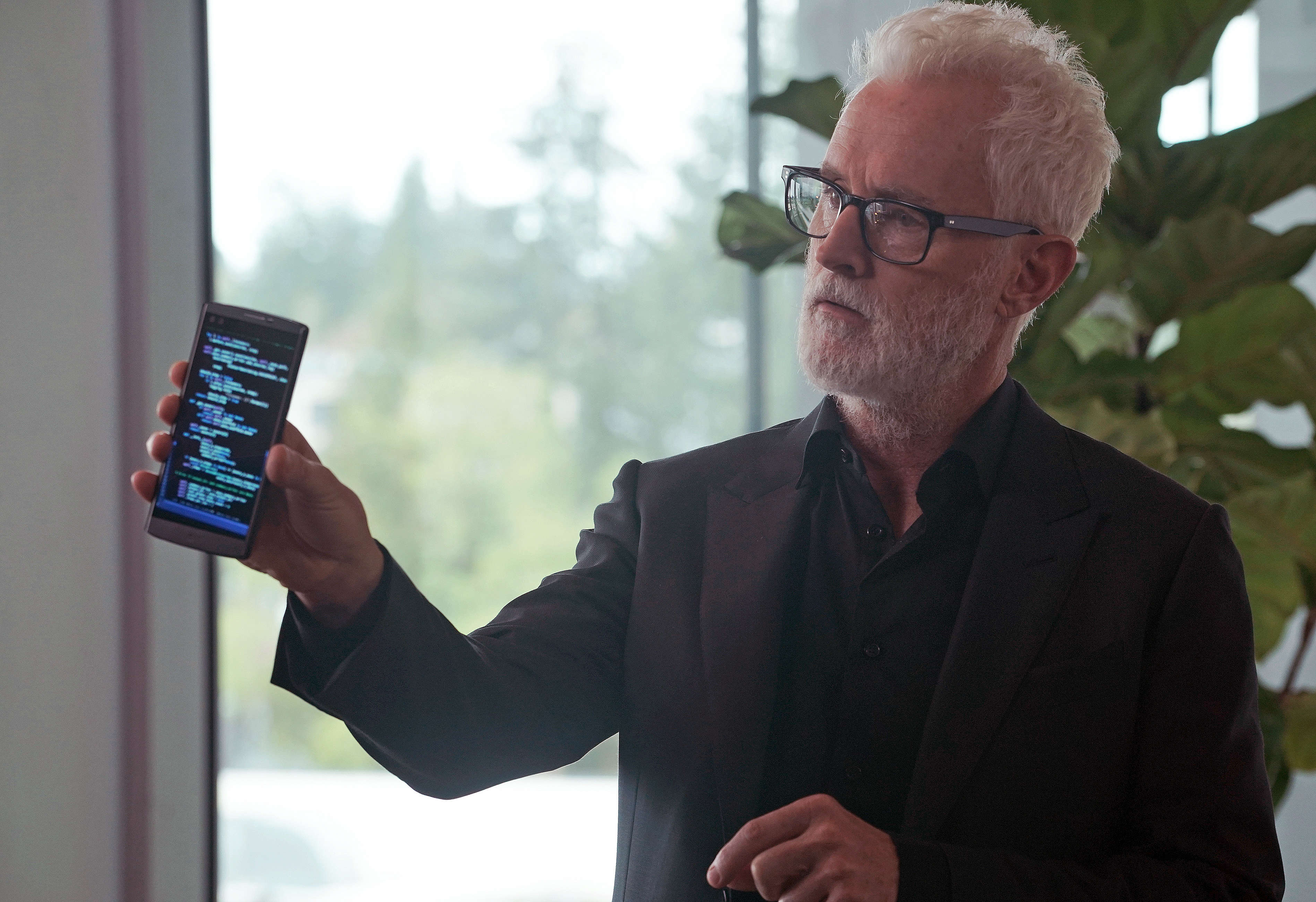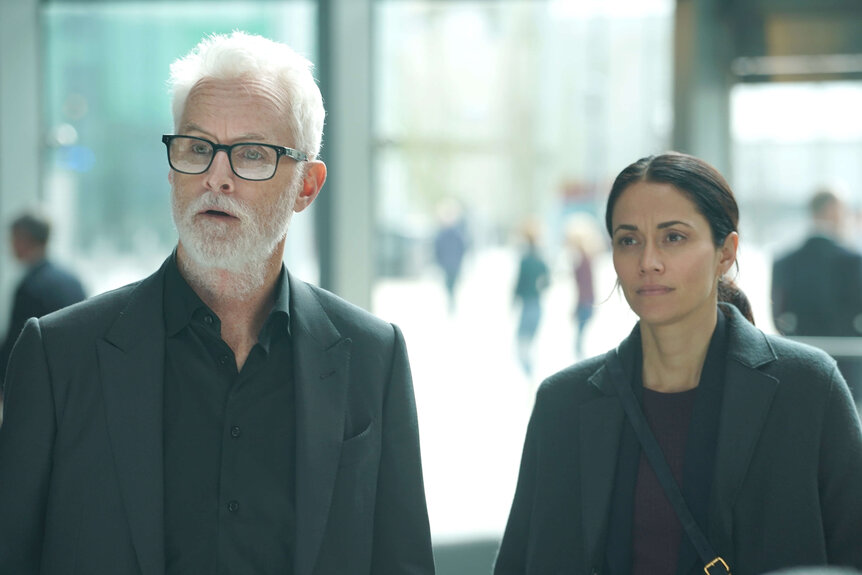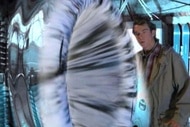Create a free profile to get unlimited access to exclusive videos, sweepstakes, and more!
Is your Alexa coming to get you? Creator of new Fox series 'neXt' explains his cyber thriller

Technology — from our phones to our TVs and even our hopped-up, WiFi-enabled cars — has become so ubiquitous in our lives, it’s actually difficult to recognize when it’s gotten out of hand. For Star Trek and 24 writer and executive producer Manny Coto, he admits it was in one of those rare recognition moments with his family that the idea for his new television series on Fox, neXt, was born.
As a father of four with a house laden with tech, including multiple Amazon Alexas, dispersed throughout, Coto tells SYFY WIRE he remembers one particular morning when his son looked particularly haggard. “I asked him what was wrong and he said that Alexa had started talking to him at 3 in the morning, out of the blue," he explains. "For a second, I thought maybe we accidentally triggered an alarm, but it apparently wasn't that. It happened one more time when he was having a sleepover with friends and they were all awoken in the middle of the night by Alexa.” Coto adds ominously, “I never got to the bottom of what was going on.”
Whether it was a momentary glitch or a kid’s sleep-induced imagination, the unsettling concept of their tech assistant maybe having a mind of its own and forming a relationship with a kid crept into Coto’s brain. “Around the same time, Elon Musk and a couple of other tech guys were sounding an alarm about the possibility of us developing a general artificial intelligence that can think, more or less, like a person," he says. "And there were a couple of books on the subject saying that if we do manage to develop that, and some people think we're close, then by nature of what it is, whatever AI we develop will become a lot smarter than we are simply because AI can rewrite its code. It would be an entity that's a thousand times smarter than we are, and we've never come across it.”
That exact premise is at the heart of neXt, the first series Coto has created. The cyber-thriller stars Mad Men’s John Slattery as the brilliant but odd Silicon Valley pioneer Paul LeBlanc, whose tech company has gotten away from him. And then there's Fernanda Andrade as FBI Special Agent Shea Salazar, who leads a team investigating an AI system that seems to be stalking and killing people on purpose. Together, they discover an emerging superintelligence program that could have a catastrophic global impact.
SYFY WIRE recently got on our high-tech smartphones to discuss what Coto wants to say with neXt. Is it a cautionary tale about how tech could own us all or just an entertaining thriller with a technological spine?
There’s no shortage of series dealing with the impact of tech on humanity. How is neXt different?
I really wanted to do something that’s positive about what it would look like if an outbreak happened today and how we would deal with it. The research always pointed to the same thing: that it would happen very quickly and if we didn't stop it fast, we never would. And so it was really just me coming out of 24 and my thriller genes kicked in. I realized this was a great thriller for a ticking clock type thriller, where a group of people are aware that an AI exists, and no one else believes them.
In what part of the process of writing this did you throw out every Alexa in your house?
[Laughs.] I've not thrown out any Alexas. I'm strangely resigned to it. Now with COVID, my kids are in there right now being educated over their screens and they're talking to the teachers. So, we're more connected now than ever. And more dependent.
You had to shut down production in March like so many other shows due to the pandemic. While you had written the season by that point, did it hit you during hiatus that the pandemic also serves as a pretty effective metaphor for the digital virus at the center of your show?
As the episodes unfurl, you'll see it's actually scary how close we came to what's happening now, in the virus, in the technology, in chaos on the streets. There are episodes that if we had tried to air them a few months ago, they may have been not air-able. It's strange. I mean, it's almost like we were doing a show about 2020, and we didn't know it.
We also have a deeply contentious election coming up that is all about how our data is manipulated to our detriment. Does that topic factor into the show too?
Yeah, we are more vulnerable because all of our information comes from narrow pipelines and that information can be manipulated. That's the one thing that the series definitely explores, especially when we get into the middle and later parts of the series, how information can be manipulated to create a certain outcome. That's what's neXt uses more than anything because the whole premise is not that an AI will come out and immediately launch nuclear bombs.
What it wants is to remain anonymous so that it can fulfill its goal. But it also has to deal with those people who think it's dangerous and want to turn it off. So it uses the most stealthy ways that it can by manipulating people through technology and destroying their lives that way.
As you sat down with your writers to break the season into a unifying story, did it start to feel vital that you create a narrative that might actually present things to the audience that they really do need to know?
The first priority was that we were telling a story that comes strictly from our character’s points of view. Whatever happens technology-wise, it's always filtered through a very specific point of view: our two lead characters primarily. How it affects their lives. It was my personal preference to see everything through their points of view. That was the number one thing.
Secondly, they know that neXt is out there, but nobody else believes them. And neXt is suddenly using technology to manipulate their lives so that their lives fall apart. In a way, it's a more subtle form of psychological attack. One episode literally addresses the way that somebody, or technology, can manipulate what people read and learn about how to create a conflagration. It’s a very scary thing that's actually ground in reality. But it's all collapsed into our people's points of view. They're seeing the world through the prism that neXt is providing for them. And it becomes almost impossible to come back. That's what's scary.
As characters and partners in this chase, LeBlanc and Salazar are pretty much polar opposites. What did you want to explore through their parallel stories throughout the season?
Gradually, these two are forced together. LeBlanc is somebody who is half computer himself. Everything just kind of flows off him with very little impact. And he's left his life and his relationships in ruins. And with her, it's the opposite. She has a wonderful, working family and that's being destroyed. LeBlanc's direction is to actually find his own humanity, and it helps him fight this thing ultimately in the end. And she has to preserve what she has and try to keep it intact. But at the same time, not allow herself to be changed into something horrible because of what she has to do.
There is real technology woven into all of this, but how close to reality do you play it?
I really wanted this to be as close to reality as possible and we insisted on that throughout the season. The only element right now in the series that is fictional is the idea that an AI could develop and become selfish, but even that is scientifically plausible. I'm just taking something that people have theorized, that you could have a program that is programmed to improve itself, which is what AI companies are doing right now. They're using AI to rewrite their own programs so it starts improving itself to the point where it becomes extremely intelligent.
And by the way, in the series, we're not dealing with something that is “self-aware” or has developed consciousness or anything like that. That's not even part of the equation. All it is is something that is incredibly smart, that has gotten way too smart for us. And that's what causes the disaster, which is again, based on the research. It could get out of hand.
Let’s talk about the look of the show. Westworld and Devs are also tech-centric with a slick and sometimes ethereal approach to how they present it. neXt looks very now.
I wanted to make it as present-day and as grounded as possible, I didn't want a futuristic, dreamy quality. And by the way, I love Devs. I thought it was off the charts. But we are fortunately completely different. I wanted to try to keep this on the streets, so to speak. And so the conscious choice was really just trying to keep it alive and immediate. That really informed the cinematography and the way it was shot, which is very 24-ish, just not real-time.
Obviously, there are so many technological stories you could tell, even with some of the characters that you've introduced in Season 1. What was your intention from the beginning about where the series can go?
In 24, we closed stories every season. I wanted that for this show, I want each season to be a closed story that has a beginning, middle, and end — [and] that ends cleanly. The idea of an AI outbreak is that, once it starts, it's not just going to be one. 24 is not just going to be one terrorist incident. In fact, there's going to be many, and they're going to take different forms.
And that's how I pitched the show, that each season is a different form of an AI catastrophe or incidents. It could be more personal, or an AI involved in politics. It could be something more in the world of medicine. Each one will be a thriller that explores what an AI situation would look like in different forms, using our characters, wherever they may be, but taking them through a different story that again, will conclude each season.
neXt premieres on Tuesday, Oct. 6, at 9/8c on FOX.



























